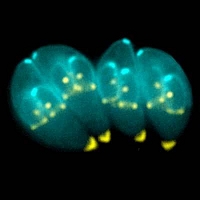Investigating the Pathways of a Parasite
 The French city of Reims holds special significance for Dr. Maud Lélu. It was where her mother became infected with the parasite Toxoplasma gondii while pregnant with Lélu, and where, 27 years later, Lélu successfully defended her doctoral dissertation on the transmission dynamics of the parasite.
The French city of Reims holds special significance for Dr. Maud Lélu. It was where her mother became infected with the parasite Toxoplasma gondii while pregnant with Lélu, and where, 27 years later, Lélu successfully defended her doctoral dissertation on the transmission dynamics of the parasite.
It was pure coincidence, Lélu said, that she came to study T. gondii, which chronically infects an estimated one-third of the total global population, including Lélu's mother, and Lélu herself, who tested positive for the parasite as an adult. Neither Lélu nor her mother experienced any of the symptoms attributed to T. gondii.
"When I was working on my master's degree, I was offered the chance to intern on a project modeling the spread of T. gondii," Lélu said. "I knew I wanted to do something in ecology, but I had never done any work specifically on T. gondii. I knew about the parasite, of course, and I knew my mother was infected with T. gondii, but I did not accept the internship based on any personal reasons. It was simply an opportunity to apply what I knew, and I soon found a new line of research that inspired my dissertation, and now my postdoctoral work."
As a postdoctoral research fellow at the National Institute for Mathematical and Biological Synthesis, Lélu focuses on understanding the evolution of parasitic life cycles and how and why some parasites develop specific transmission cycles while others like T. gondii remain generalists. Another part of her research investigates why the mortality of the disease, or virulence level, in mice differs from one geographic area to another. Lélu, who has a Ph.D. in ecology from the University of Reims Champagne-Ardennes, considers what ecological factors, such as host densities, host species, and predator-prey relationships, affect mortality.
T. gondii is considered as one of the most successful parasites for its unusual ability to infect a wide range of intermediate hosts, including humans. In humans, T. gondii can cause toxoplasmosis, a disease most commonly acquired from contact with soil or water contaminated by infected cat feces, or with raw or undercooked meat. According to the Centers for Disease Control, toxoplasmosis is considered to be a leading cause of death attributed to foodborne illness in the United States. More than 60 million men, women, and children in the U.S. carry the T. gondii parasite, but very few have symptoms because the immune system usually keeps the parasite from causing illness. However, pregnant women are advised to stay away from cat litter, as toxoplasmosis can infect a fetus, causing malformation or abortion. The toxoplasmosis parasite has also been shown to trigger the development of schizophrenia and other bipolar disorders.
Though the T. gondii parasite can infect almost any mammal, it can only sexually reproduce within the bodies of cats. Infected felines excrete the eggs, which then enter soil, vegetation, and water reservoirs, before being ingested by a new host. Indoor cats pose no threat because they typically don't carry the parasite. Outdoor cats shed the parasite for only three weeks of their life, typically when they’re young and newly exposed to hunting outdoors.
Most hosts are able to fight the parasite by trapping it in cyst-like tissue formations, where the parasite theoretically lies dormant until the host either dies or is eaten by a new host, as there is currently no way to get rid of the parasite.
Lélu's research on parasitic life cycles fits well with research already underway at NIMBioS, which has hosted an Investigative Workshop focused on modeling the life cycle of T. gondii. and is currently supporting a Working Group on T. gondii.
For more information about postdoctoral fellowships and other research and educational opportunities at NIMBioS, visit our website at http://www.nimbios.org.
#
The National Institute for Mathematical and Biological Synthesis (NIMBioS) brings together researchers from around the world to collaborate across disciplinary boundaries to investigate solutions to basic and applied problems in the life sciences. NIMBioS is supported by the National Science Foundation, the U.S. Department of Homeland Security, and the U.S. Department of Agriculture with additional support from The University of Tennessee, Knoxville.
NIMBioS
1122 Volunteer Blvd., Suite 106
University of Tennessee
Knoxville,
TN 37996-3410
PH: (865) 974-9334
FAX: (865) 974-9461
Contact NIMBioS


